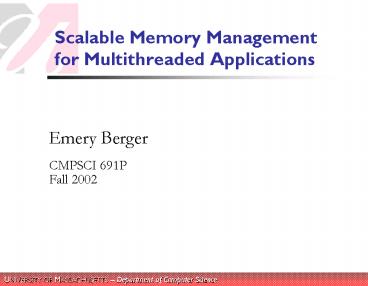Scalable Memory Management for Multithreaded Applications - PowerPoint PPT Presentation
Title:
Scalable Memory Management for Multithreaded Applications
Description:
AOL, British Telecom, Novell, Philips. Reports: 2x-10x, 'impressive' improvement in performance. Search server, telecom billing systems, scene rendering, ... – PowerPoint PPT presentation
Number of Views:43
Avg rating:3.0/5.0
Title: Scalable Memory Management for Multithreaded Applications
1
Scalable Memory Managementfor Multithreaded
Applications
Emery Berger
CMPSCI 691P Fall 2002
2
High-Performance Applications
- Web servers, search engines, scientific codes
- C or C
- Run on one or cluster of server boxes
software
compiler
- Needs support at every level
runtime system
operating system
hardware
3
New Applications,Old Memory Managers
- Applications and hardware have changed
- Multiprocessors now commonplace
- Object-oriented, multithreaded
- Increased pressure on memory manager(malloc,
free) - But memory managers have not changed
- Inadequate support for modern applications
4
Current Memory ManagersLimit Scalability
- As we add processors, program slows down
- Caused by heap contention
Larson server benchmark on 14-processor Sun
5
The Problem
- Current memory managersinadequate for
high-performance applications on modern
architectures - Limit scalability, application performance, and
robustness
6
Overview
- Problems with current memory managers
- Contention
- False sharing
- Space
- Solution provably scalable memory manager
- Hoard
7
Problems with General-Purpose Memory Managers
- Previous work for multiprocessors
- Concurrent single heap Bigler et al. 85, Johnson
91, Iyengar 92 - Impractical
- Multiple heaps Larson 98, Gloger 99
- Reduce contention but cause other problems
- P-fold or even unbounded increase in space
- Allocator-induced false sharing
we show
8
Multiple Heap AllocatorPure Private Heaps
Key
- One heap per processor
- malloc gets memoryfrom its local heap
- free puts memoryon its local heap
- STL, Cilk, ad hoc
in use, processor 0
free, on heap 1
processor 0
processor 1
x1 malloc(1)
x2 malloc(1)
free(x1)
free(x2)
x4 malloc(1)
x3 malloc(1)
free(x3)
free(x4)
9
ProblemUnbounded Memory Consumption
- Producer-consumer
- Processor 0 allocates
- Processor 1 frees
- Unbounded memory consumption
- Crash!
processor 0
processor 1
x1 malloc(1)
free(x1)
x2 malloc(1)
free(x2)
x3 malloc(1)
free(x3)
10
Multiple Heap AllocatorPrivate Heaps with
Ownership
- free returns memory to original heap
- Bounded memory consumption
- No crash!
- Ptmalloc (Linux),LKmalloc
processor 0
processor 1
x1 malloc(1)
free(x1)
x2 malloc(1)
free(x2)
11
ProblemP-fold Memory Blowup
- Occurs in practice
- Round-robin producer-consumer
- processor i mod P allocates
- processor (i1) mod P frees
- Footprint 1 (2GB),but space 3 (6GB)
- Exceeds 32-bit address space Crash!
processor 0
processor 1
processor 2
x1 malloc(1)
free(x1)
x2 malloc(1)
free(x2)
x3malloc(1)
free(x3)
12
ProblemAllocator-Induced False Sharing
- False sharing
- Non-shared objectson same cache line
- Bane of parallel applications
- Extensively studied
- All these allocatorscause false sharing!
cache line
processor 0
processor 1
x2 malloc(1)
x1 malloc(1)
thrash
thrash
13
So What Do We Do Now?
- Where do we put free memory?
- on central heap
- on our own heap(pure private heaps)
- on the original heap(private heaps with
ownership) - How do we avoid false sharing?
- Heap contention
- Unbounded memory consumption
- P-fold blowup
14
Overview
- Problems with current memory managers
- Contention
- False sharing
- Space
- Solution provably scalable memory manager
- Hoard
15
Hoard Key Insights
- Bound local memory consumption
- Explicitly track utilization
- Move free memory to a global heap
- Provably bounds memory consumption
- Manage memory in large chunks
- Avoids false sharing
- Reduces heap contention
16
Overview of Hoard
global heap
- Manage memory in heap blocks
- Page-sized
- Avoids false sharing
- Allocate from local heap block
- Avoids heap contention
- Low utilization
- Move heap block to global heap
- Avoids space blowup
processor 0
processor P-1
17
Summary of Analytical Results
- Space consumption near optimal worst-case
- Hoard O(n log M/m P) P n
- Optimal O(n log M/m) Robson 70
bin-packing - Private heaps with ownership O(P n log M/m)
- Provably low synchronization
n memory required M biggest object size m
smallest object size P processors
18
Empirical Results
- Measure runtime on 14-processor Sun
- Allocators
- Solaris (system allocator)
- Ptmalloc (GNU libc)
- mtmalloc (Suns MT-hot allocator)
- Micro-benchmarks
- Threadtest no sharing
- Larson sharing (server-style)
- Cache-scratch mostly reads writes (tests for
false sharing) - Real application experience similar
19
Runtime Performance threadtest
- Many threads,no sharing
- Hoard achieves linear speedup
speedup(x,P) runtime(Solaris allocator, one
processor) / runtime(x on P processors)
20
Runtime Performance Larson
- Many threads,sharing(server-style)
- Hoard achieves linear speedup
21
Runtime Performancefalse sharing
- Many threads,mostly reads writes of heap data
- Hoard achieves linear speedup
22
Hoard in the Real World
- Open source code
- www.hoard.org
- 13,000 downloads
- Solaris, Linux, Windows, IRIX,
- Widely used in industry
- AOL, British Telecom, Novell, Philips
- Reports 2x-10x, impressive improvement in
performance - Search server, telecom billing systems, scene
rendering,real-time messaging middleware,
text-to-speech engine, telephony, JVM - Scalable general-purpose memory manager































